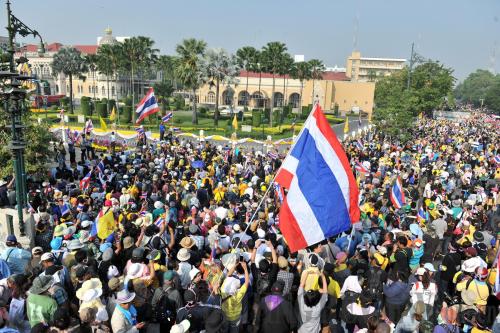|
 |
|
CONFLICT: Thai anti-government protesters rally at Government House in Bangkok on December 9, 2013. The demonstrators vowed to keep up their fight to overthrow Prime Minister Yingluck Shinawatra despite her decision to call an election to help end the kingdom's political crisis (GAO JIANJUN) |

Thai Prime Minister Yingluck Shinawatra's decision to push for the passage of an amnesty bill by the House of Representatives on November 1 triggered waves of mass protest in the nation. For more than one month, demonstrators opposed to former Thai Prime Minister Thaksin staged both street protests and parliamentary struggles, including the occupation of government buildings, to demand the repeal of the controversial Amnesty Bill as well as Yingluck's resignation. The continually escalating chaos in the nation had thus far resulted in five deaths and more than 200 injuries, as of December 12.
The disorder in Thailand caused fear and concern both within the nation and abroad. Many worried that the bloody tragedy of three years ago could repeat once again. However, to predict and understand the trends behind the Thai political situation, one must hold a comprehensive view and consider various factors in seeking out the long-term stable "constant" as well as the hidden "variables."
Persistent contradictions
The Amnesty Bill is the spark that ignited the new wave of turbulence in Thailand. The bill is designed to grant a blank pardon to those involved in political unrest and bloodshed since the 2006 military coup until August 8 this year, including Thaksin. Yingluck tried hard to push bill through the congress despite heavy pressure from the Democratic Party and other opposition groups. Thus, the current political turbulence in Thailand has not changed, and still centers on Thaksin.
Since anti-Thaksin protesters took to the streets in protest of Thaksin's family selling shares in Shin Corp to Temasekin in February 2006, the confrontation of the two camps has evolved from parliamentary struggle to street politics and ultimately supreme authority. If general elections were held, the pro-Thaksin camp would likely win since they have the majority of voters, which would then draw resistance from the anti-Thaksin camp. If anti-Thaksin forces hold power without being elected or even by restoring military rule, it will likewise create resistance from the pro-Thaksin camp. No matter which camp takes power, then, it will likely arouse protests from the other camp in the form of street politics. Though the ultimate authority of the Thai monarch would bring temporary peace for the country, the two camps would eventually break out into conflict.
After Yingluck won the 2011 general election with an overwhelming advantage, the political situation in Thailand was relatively stable. However, Yingluck's attempt to further consolidate her power by taking advantage of the parliamentary majority of her party once again disturbed the previous calm. Yingluck took three steps: First, using the Amnesty Bill to pave the way for the return of Thaksin; second, pushing a revision of the Thai constitution to amend the election approach of the Thai upper house; and last, asking Thailand's Special Investigation Department to accuse former Prime Minister Abhisit of murder and charge former Deputy Prime Minister Suthep with attempted murder, saying both of them should take responsibility for the 2010 military crackdown against Red Shirt protesters that left two civilians killed and one injured.
This aroused strong reaction from Democratic Party and other opposition groups, which employed all approaches including judiciary, parliament and street politics to riposte. The oppositions first submitted to constitutional court arbitration that the ruling coalition's draft proposition violated the constitution. They also promoted a no-confidence motion against the Yingluck administration in the lower house of parliament. And then, they once again launched a new mass campaign asking Yingluck to step down and calling for the establishment of a people's council.
Yingluck took counter measures to fight back, such as repealing the Amnesty Bill to reduce the opposition. In addition, she refused to accept the judgment of the constitutional court, saying that draft proposition has violated the constitution, and firmly rejected the proposal of the people's council by the oppositions, declaring it to be unconstitutional.
| 